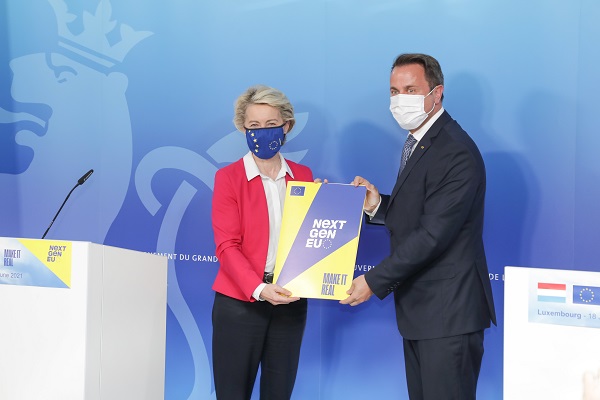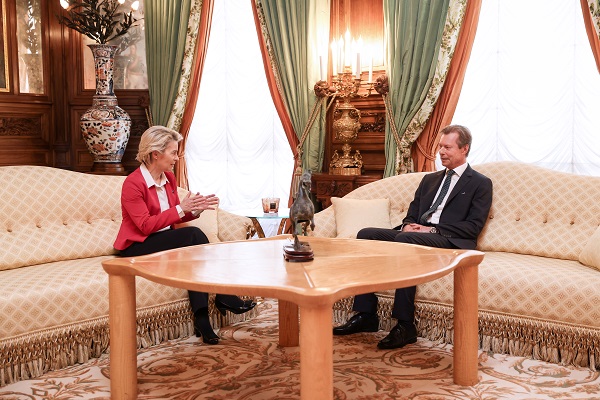 L-R: (above) Ursula von der Leyen, European Commission President; Xavier Bettel, Luxembourg's Prime Minister; (below) President Ursula von der Leyen; HRH Grand Duke Henri;
Credit: (Above) SIP / Lux Deflorenne / (below) Maison du Grand-Duc / Sophie Margue
L-R: (above) Ursula von der Leyen, European Commission President; Xavier Bettel, Luxembourg's Prime Minister; (below) President Ursula von der Leyen; HRH Grand Duke Henri;
Credit: (Above) SIP / Lux Deflorenne / (below) Maison du Grand-Duc / Sophie Margue
On Friday 18 June 2021, the European Commission adopted a positive assessment of Luxembourg's recovery and resilience plan; this is an important step towards the European Union (EU) disbursing €93 million in grants under the Recovery and Resilience Facility (RRF).
The RRF, which is at the heart of the NextGenerationEU fund, will provide up to €672.5 billion to support investments and reforms across the EU. The Luxembourgish plan forms part of an unprecedented coordinated EU response to the COVID-19 crisis, to address common European challenges by embracing the green and digital transitions, to strengthen economic and social resilience and the cohesion of the Single Market.
The Commission assessed Luxembourg's plan based on the criteria set out in the RRF Regulation, considering in particular whether the investments and reforms set out in the plan support the green and digital transitions, contribute to effectively addressing challenges identified in the European Semester and strengthen its growth potential, job creation and economic and social resilience.
The Commission's assessment found that Luxembourg's plan allocates 61% of total expenditure to measures that support climate objectives. This includes measures to supply renewable energy to a housing district project in Neischmelz, a support scheme for the deployment of charging points for electric vehicles, and the "Naturpakt" scheme encouraging municipalities to protect the natural environment and biodiversity.
The Commission also found that Luxembourg's plan devotes 32% of total expenditure to measures that support the digital transition. This includes investments in the digitalisation of public services and procedures; digitalisation of projects for healthcare, such as an online solution for remote healthcare checks, and the establishment of a laboratory for testing ultra-secure communication connections based on quantum technology. In addition, investments in targeted training programmes will provide job seekers and workers on short-time work schemes with digital skills.
The Commission considered that Luxembourg's plan would contribute to effectively addressing all or a significant subset of challenges identified in the relevant country-specific recommendations (CSRs). Specifically, it contributes to addressing CSRs on labour market policies through addressing skills mismatches and enhancing the employability of older workers. It also contributes to increasing the resilience of the healthcare system, increasing available housing, the green and digital transitions and the enforcement of the anti-money laundering framework.
Luxembourg's plan proposes projects in five European flagship areas. These are specific investment projects dealing with issues that are common to all Member States in areas that create jobs and growth and are needed for the green and digital transitions. For instance, Luxembourg has proposed measures aimed at increasing the effectiveness and efficiency of public administration service through enhanced digitalisation.
The assessment also found that none of the measures included in the plan significantly harm the environment, in line with the requirements laid out in the RRF Regulation.
The control systems put in place by Luxembourg were considered adequate to protect the financial interests of the EU. The plan also provided sufficient details on how national authorities would prevent, detect and correct instances of conflict of interest, corruption and fraud relating to the use of funds.
European Commission President Ursula von der Leyen announced the news of this positive assessment on the occasion of her working visit to Luxembourg on Friday. She commented: "Today, the European Commission has decided to give its green light to Luxembourg's recovery and resilience plan. The plan places a strong emphasis on measures that will help secure the green transition, demonstrating Luxembourg's commitment to creating a more sustainable future. I am proud that NextGenerationEU will play an important role in supporting these efforts".
During her Luxembourg visit, which formed part of her tour to assess national recovery plans, the Commission President met with Prime Minister Xavier Bettel and Minister of Finance Pierre Gramegna at the headquarters of Luxembourg satellite company SES in Betzdorf, where she officially announced the Commission's favourable opinion.
“The COVID-19 crisis reminded us once again: we need a common, strong and united European response to get out of crises. But it has also shown that we need to put even more emphasis on high-quality investments with a focus on sustainability and digitization. Our continent needs long-term investments, which will strengthen the single market and make the EU more competitive. And this is precisely the objective of the 'Next Generation EU' programme, which, with its €750 billion, will lay the foundations for a robust European recovery after COVID-19", noted Prime Minister Xavier Bettel. "And if we look at the objectives of 'Next Generation EU', it is obvious that this is perfectly in line with the priorities of the Luxembourg government. Namely, creating a sustainable, just and resilient economic ecosystem that promotes social cohesion, responding to both the challenges of an increasingly digital world and a planet in climate crisis”.
On the subject of digital technologies, Luxembourg's Prime Minister announced that €10 million of the €93 million which Luxembourg will receive through the RRF "will be devoted to the LuxQCI [Luxembourg Quantum Communication Infrastructure] project. The quantum communication infrastructure will thus become one of the main digital priorities of the Luxembourg government". He added: "Thanks to the EU's investment [...], Luxembourg will actively contribute to European strategic autonomy and allow the EU to assume a greater role as a global digital leader”.
Finance Minister Pierre Gramegna commented: “Luxembourg is among the first countries to have presented its Plan for Recovery and Resilience, and I welcome its prompt approval. Luxembourg has exceeded the requirements in terms of digital and climate transition for the selected investment projects, by working in close collaboration with Commissioner [Paolo] Gentiloni, whom I thank for his commitment”.
During her working visit, Commission President Ursula von der Leyen also met with His Royal Highness the Grand Duke of Luxembourg at the Grand Ducal Palace.









